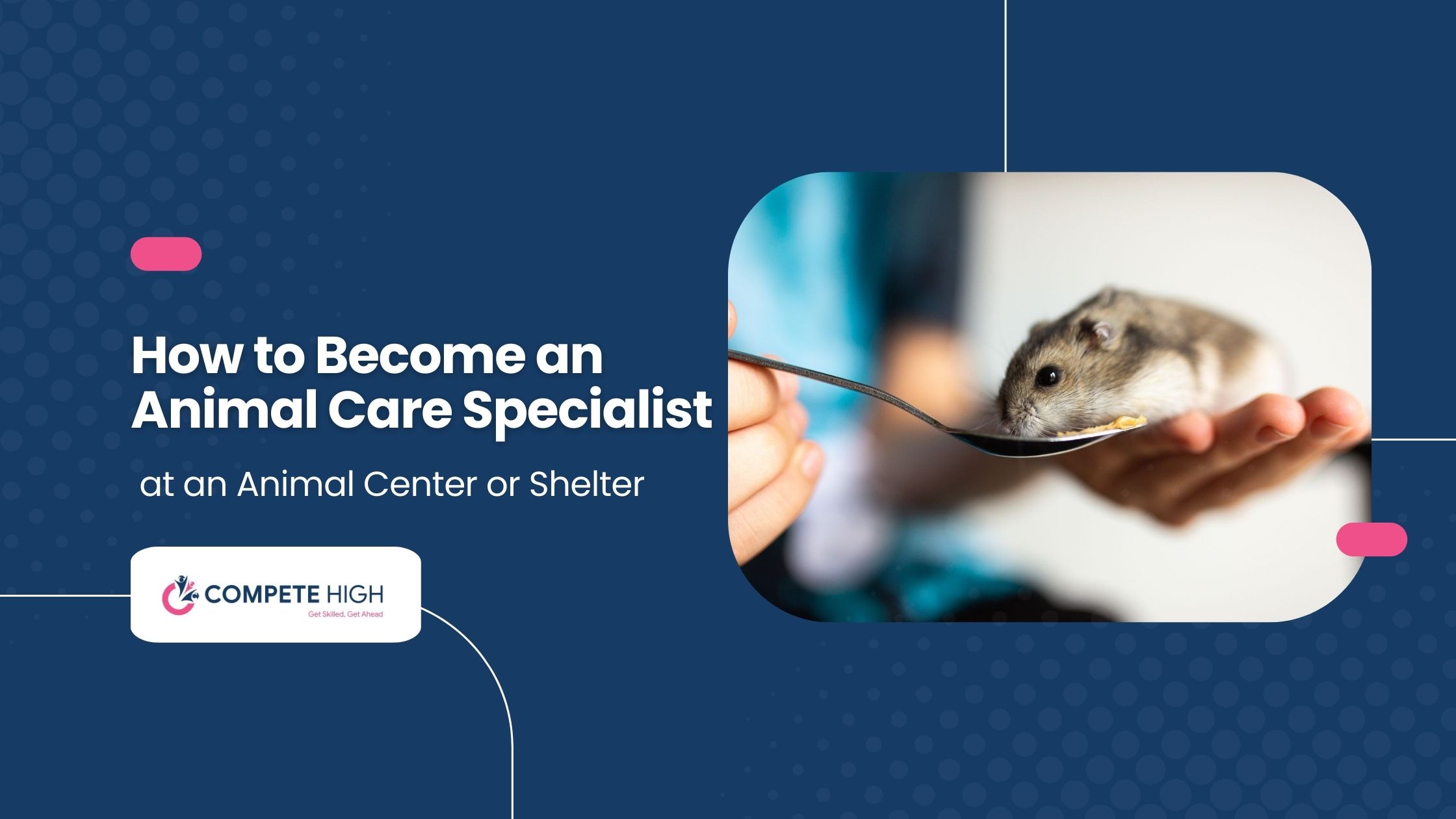
Working as a staff member at an animal center or shelter is an incredibly rewarding job. With so many animals in need of care and a fair chance at life, being part of an animal center or shelter's efforts to save lives is a symbiotic relationship. This blog briefly covers the tasks, education, skills, and practice needed to become an animal center or shelter worker.
Understanding the Role
Definition and Responsibilities
An animal care specialist provides pets with the love and care they require at an animal center or shelter.
Main Duties: To serve the animals food and water in balance and regularity is a daily job in an animal center or shelter; to keep the animals groomed well and clean enough, like brushing, bathing, and nail clipping.
A Lot of Medical Care is Involved: Dispensing drugs, observing for health issues, and helping with vet visits in an animal center or shelter. Specialists must not only recognise sick cats and dogs but also be poised to address the issues quickly.
Socialisation is another important duty. Cats get handled and accustomed to human company. And kittens, puppies, and some other animals are introduced to one another to reduce stress and ease their transition from animal center or shelter to home.
The job at an animal center or shelter includes cleaning and maintaining living spaces; keeping records to track an animal’s health, behaviour and improvement; and assessing the bodily movements of pets within the scope of the owner’s preferences. Many other specific tasks are also part of their foundation and during their major performance.
Importance of the Role
Animal Welfare and Rehabilitation: Animals in the animal center or shelter have important relationships with the people in animal services who care for them. They get consistent care and attention so that the creatures feel more comfortable with people, which leads to improved health and makes them more attractive to potential adopters. Animals who are abused or neglected might need rehabilitation before they can be placed in a home.
Contribution to the Animal Center or Shelter’s Mission and Community: Specialists play an integral role in ensuring that animals are in good health and well-intentioned so that they can be adopted into forever homes. Specialists represent the animal center or shelter through community outreach programmes and networking events to educate the public about responsible pet ownership and the importance of animal welfare.
Improving Rates of Adoption: Their work directly impacts rates of adoption; animals that are well taken care of will be more quickly adopted, opening up space at the animal center or shelter for more animals in need of care to be brought in.
By introducing themselves, specialists develop trust with the animals, facilitating an alleviation of fear and anxiety responses. Once trust is established, animals are better able to accept the support they need to thrive and, subsequently, better integrate into their new homes.
Educational Requirements
High School Education
Important Courses for Animal Care Specialists: A lot of students who are interested in becoming animal specialists are high school students. For these students, biology and science courses are informative subjects for future professions. Colleges give animal care specialists electives for biology and science, in a country where we don't simply learn scientific subjects. So it’s important to have bud for animal care specialists.
High School Work Experience: If a highschool student wants to work part-time in a veterinary clinic, volunteering at a local animal animal center or shelter or veterinary clinic is a great way to get some experience. One can get practical knowledge working with animals, develop an affinity for the work, and begin making connections in the industry.
Additional Activities: Getting involved in clubs such as 4-H or Future Farmers for America (FFA) can be of special benefit if you have a special interest in animals. These clubs offer educational trips, competitions, and community service projects.
Relevant Degrees and Certifications
Get a degree in veterinary technology, animal science or related field. This is helpful. I also recommend animal anatomy, nutrition, and other issues related to becoming an animal care specialist.
Certifications (e.g., Certified Veterinary Technician [CVT] or Animal Care Specialist [ACS]): Getting certifications demonstrates a dedication to your position and can lead to job opportunities. CVT or ACS certification demonstrates that you have additional training and are more skilled than other employees and applicants.
Specialised Training Programmes: A few programmes offered by various institutions, like universities and private organisations, focus especially on animal care and welfare and may incorporate classroom and laboratory training along with practical experience.
Continuing Education
Why is it important to stay up-to-date with animal care techniques and developments? Development in the field of animal care is swift; this is why professionals in the sector need to stay up-to-date.
Workshops, courses, and seminars are other opportunities for continuing education. Small or larger conferences can be attended to obtain new skills, be updated on the latest in industry progress and developments, and so on. These opportunities can come from professional organisations, veterinary schools, and animal welfare groups.
The number of online learning options has increased significantly, with dozens of respected sources offering courses and webinars for professionals too busy to attend more conventional educational programs. Courses in advanced medical techniques, animal behaviour, and many other areas are available with a single click on a computer keyboard.
Professional development resources: Subscribe to industry journals, join professional associations, and attend conferences.
Experience: Networking with peers and experts can be a valuable source of information and support.
Gaining Practical Experience
Volunteer Work at an Animal Center or Shelter
Volunteer at Local Animal Center or Shelters or Rescue Organisations: Volunteering is a great first step in gaining ‘hands-on’ experience in animal care techniques. Many local animal center or shelters and rescue organisations are highly dependent on willing helpers for most of their daily chores.
Becoming Hands-on with Caretaking: Volunteers can help out with feeding, cleaning, and socialising animals. This can help to build up an understanding of what animals need and how they behave as individuals and as a species. A benefit of volunteering is also being able to see what happens behind the scenes and watch and learn from staff and other volunteers.
Cultivate Contacts: Volunteering puts you in touch with professionals in that field who can serve as mentors and references, or even provide job leads down the road.
Internships and Apprenticeships
Internships at Veterinary Clinics, Animal Center or Shelters: Internships consist of more structured and in-depth training. You can search for internship opportunities at veterinary clinics, animal centers or shelters, and wildlife rehabilitation centres. Start applying for the job early and demonstrate your passion for taking care of animals to improve your possibility of being accepted.
Learning from Experience: 1. Understand procedures for administering medication, performing basic medical procedures, or handling animals safely by working closely with an experienced professional in an internship or apprenticeship.
Personal Development: To help structure your job search, it’s useful to have a personal inventory of your own experience and training. When a company has provided you with training sessions and evaluations, as is common with internships, it’s easy to see where you’ve excelled as well as focus on areas you can improve. Job hunters can use such practical feedback to inform their search process and aid in job applications and interviews.
Entry-Level Positions
Entry-level roles, such as Kennel Assistant or Animal Care Attendant. First jobs provide the initial foot in the door of working with animals. Positions such as kennel assistant, animal care attendant, or veterinary assistant can give hands-on working experience and build fundamental skills.
Grounding Careers in Realistic Skills and Knowledge: These jobs involve carrying out daily animal care responsibilities, like feeding, cleaning, observing health and behaviour, learning from experienced leaders, and gaining hands-on experience to grow your skill set and ability to move forward in your career.
Stepping Stones: Low-level jobs can be a starting point for further, more advanced roles. Working hard and proving you are trustworthy and eager to learn can lead to promotion and more duties.
Cultivating Confidence: Taking an entry-level job allows you to build confidence in your capabilities. Not only does getting better at whatever you’re asked to do make you more ready for more difficult, less menial work, but finding that you can succeed at something is deeply satisfying in itself.
Developing Essential Skills
Animal Handling and Behavior
Recognise Animal Behaviour and Body Language: Knowing the behaviour and body language of your pet gives you the ability to detect danger when it arises and provide excellent care. Animals vary widely among different species and even among individuals of the same species. There are also many types of signals for such things as communicating with one another.
Safe and Humane Handling: Safe and humane handling is an essential skill to minimise stress on the animal and to prevent injuries to the worker, such as bites or scratches. Good, safe, and humane handling involves gentle methods of restraint, knowing when to leave an animal alone, and even the technique for approaching the animal. Practising these skills can dramatically improve handling techniques and skills. Training sessions should be provided to help enhance these skills.
Hands-on: The more hands-on time you can have with several different animals, the easier and more confident you will be when working with them. Watching more experienced handlers increases your ability to read and understand animals.
Medical and Health Care Skills
Basic Medical Care, First Aid, and Medications), routine health checks, prescribed medication, grooming and training basic manners, safety precautions, and knowledge of warning signs.
Keeping Animals Entertained: Basic animal care techniques require the ability to groom, handle, socialise, and train basic manners. Dogs are often exercised and kept engaged, whether it be on a structured walk or a play session with ball retrieval, agility equipment, or fetching frisbees. Cats are kept entertained with playtime using feather teaser toys or jingle balls.
Spotting the Early Signs of Illness and Injury: Be able to spot signs of illness and injury as soon as possible. Read symptoms, changes in appetite and behaviour, as well as physical changes. Learn basic veterinary first aid or veterinary assistance if possible.
Continuing Education: If you come across workshops or courses related to veterinary care in your area, you should take advantage of them. Holding animal first aid or veterinary assistant certification can attract animal owners to your clinic.
Communication and Interpersonal Skills
Effectively Communicating with Staff, Volunteers, and the General Public: Animal center or shelters exist in a bustling work environment overflowing with co-workers and volunteers, where effective communication plays a key role. Education of the general public concerning the care and keeping of animals and animal center or shelter policies is also of paramount importance and helps create a supportive community.
Compassionate Care and Support of Animals and Their Adopters: Compassion is a trait for career professionals in animal services. Showing empathy for animals and potential adopters inspires a positive setting and aids in guiding adopters through the adoption process and providing advice for the new pet owner.
Training for the Role: Being able to provide good service to their customers is an important skill for anyone working in the public sector. This requires having the right combination of people skills to respond to queries, resolve disagreements, and provide clear and helpful information.
Finding Employment
Job Search Strategies
How to Look for Job Openings in Animal Center or Shelters and Rescues: You can start by looking at the places where you can find many jobs working with animals posted. Some examples are Indeed, Glassdoor, and LinkedIn, as well as the websites and social media pages of animal center or shelters and rescues.
Build a Network in Animal Care: To improve your job search prospects, it’s important to build a network in the animal care specialist community. Attend industry events, workshops, and conferences to meet professionals who may have job opportunities for you in the future. A great way to start your career is by joining professional organisations and animal care specialist forums by attending their events and joining online platforms such as LinkedIn.
Volunteering and Internships: Volunteer work or an internship at an animal center or shelters often leads to employment. Volunteer work or an internship allows you to show the skills and dedication required by the animal center or shelter, and you may be offered a job when the next one comes up.
Crafting a Strong Resume and Cover Letter
Revealing Relevant Experience and Skills: Do not be ‘too precise’ in the information you choose to showcase on your CV. Include relevant experience, such as volunteer experience, internships, and any kind of ‘dog-related job’. List your hands-on experience with animals, knowledge of the animal care specialist practices, and certificates or training you’ve undertaken.
Tailor Application to Position and Organisation: Write the resume and cover letter for a specific application. Research an animal center or shelter or rescue organisation and include information about how their mission or values match your own and how you would complement their team based on skills or experiences specific to that agency.
Presentation: Your resume must also exhibit a good presentation and be well organised and easy to read. A professional format must be used, adhering to punctuation, spacing, and grammar. Any spelling mistakes or typos will not be tolerated. Your cover letter must be short and engaging and showcase your genuine love for animals.
Preparing for Interviews
Sample Interview Questions for a Position in Animal Care as Animal Care Specialist:
Common questions at an interview to determine if you are a good fit for the work will likely include:
- Why do you want to work in animal care?
- Can you describe your experience with handling animals?
- How do you manage stressful situations with difficult animals or circumstances?
Demonstrating Passion and Commitment to Animal Welfare: Share your passion as an animal care specialist and demonstrate your willingness to provide good-quality care to as many animals as possible. Give examples of how you have contributed to the care of animals in the past, such as through volunteering, working in an internship, or prior employment.
In Your Hands: Some interviews will test your skill at handling animals. Be prepared to demonstrate your competence in handling animals safely and humanely.
Do Your Research: Demonstrating that you know who they are, what they do, and, more importantly, how you can help them with their mission and goals, is going to make you more memorable.
Excelling in the Role
Ongoing Professional Development
You can learn new things that can advance your knowledge. Another vital component for success as an animal care specialist is pursuing more certifications and specialisations. You can get another certification to become an expert in animal behaviour, a veterinary assistant, or an animal care specialist. Other credentials can enhance your offer of services as your career advances.
Attend Conferences and Workshops: These will keep you abreast of the newest ideas and top practices in animal care. Great conferences and workshops have a wealth of information for animal care regarding the latest in research, products, testing styles, and techniques, as well as leading research. You can glean a lot from networking with your peers as well as hearing from experts.
Professional Associations: Membership in professional associations likely to encompass your area of work with animals can be beneficial. Such organisations offer a source for continuing education and professional development as they often offer training materials and certification programmes, as well as publishing industry information.
Building Relationships
Cooperate Well with Peers, Volunteers, and Veterinarians: Good working relationships are important with your peers, volunteers, and veterinarians. Cooperation builds a unified team where all animal welfare needs are met effectively and kindly. Good communication and camaraderie can make coming to work a joyful experience.
Creating an Encouraging Work Environment: Being in a motivating environment will help increase productivity and job satisfaction. Make sure that everyone has a particular value and looks out for each other. The more appreciative your coworkers and volunteers are, the better the team dynamic will be. Always take the time to give patients a pat on the back and let them know when they've done a good job. Tell them how they are all adding value. Additionally, never be afraid to give constructive feedback on ways for people to improve if you see it is needed.
Mentee: Find mentors and champions among more senior staff, and practise acting as a mentor to newer staff or volunteers. Mentoring relationships help staff learn the ropes and further their careers.
Advocating for Animal Welfare
Encouraging Others to Adopt the Best Possible Animal Care: An animal center or shelter animal care specialist should advocate for promoting the best possible animal care. This can be done by staying up-to-date on new research and revised guidelines and making sure that the best practices are kept and carried out within the facility. Sharing one’s knowledge with others can raise the standard of animal care everywhere within the animal center or shelter.
Partner with the Community to Raise Awareness: Reach out to the community by participating in community events and programmes and actively engaging with groups in our local neighbourhoods.
Social Media and Outreach: Post stories, updates, and information about the animal center or shelter and its animals on social media to get the word out. Social media is a great tool that can help the animal center or shelter reach many more people.
Coordinating Volunteers: By working directly with volunteers and providing direction and training, a coordinator can ensure that volunteers are properly prepared to assist with animal care and that they are utilised in the most effective way to aid the animal center or shelter.
Conclusion
Starting down the path that leads to being an animal care specialist at an animal center or shelter involves a little bit of training, a little bit of on-the-job experience, and a lot of learning how to be comfortable with skills that might feel awkward or uncomfortable at first. From volunteering and internships to certifications, here are some of the milestones along the way.
If you have a love for animals and a commitment to their welfare, an animal care specialist career can be very rewarding. Not only is your daily work enriching, but the lives you can transform for the better in an animal center or shelter environment are indescribable.










